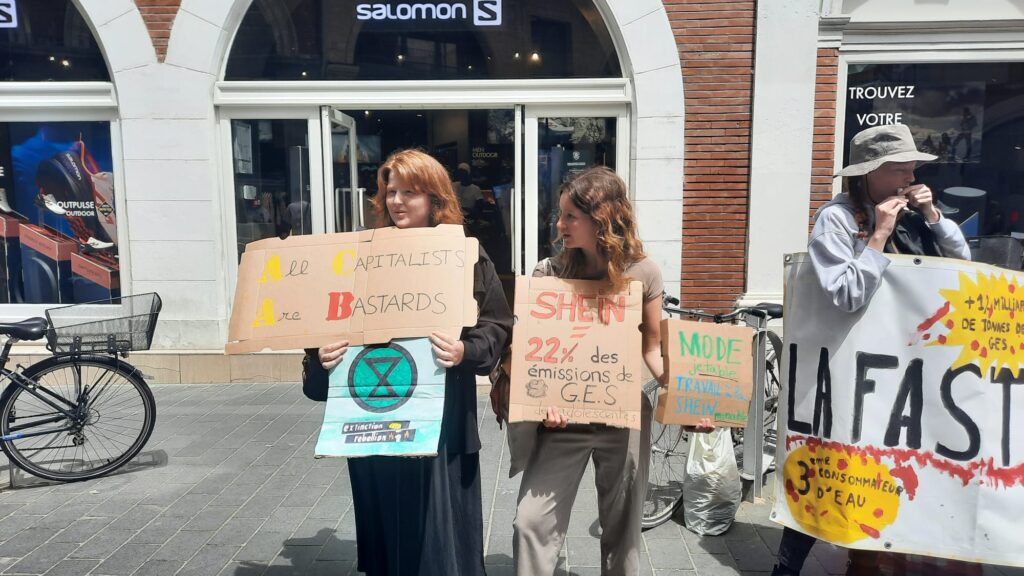The Battle Against Fast Fashion: France’s Stalled Effort to Regulate Shein and Temu


A Bold Initiative Stuck in Limbo
A ground-breaking piece of legislation aimed at holding fast fashion giants like Shein and Temu accountable for their environmental impact has stalled in France, leaving industry leaders and sustainability advocates frustrated. What was once considered a promising move toward responsible fashion consumption has been caught in political gridlock, delaying much-needed reform.
Vestiaire Collective co-founder and president Fanny Moizant didn’t hold back her disappointment, calling it “a national scandal” in a fiery social media post. “Shein wins again,” she declared, reflecting the growing concern that ultra-fast-fashion retailers are slipping through the cracks of regulatory oversight.
At the heart of the debate is a proposed “sin tax” on fast fashion, a radical initiative that sought to impose a penalty of up to €10 ($10.50) per item on clothing deemed environmentally harmful. But despite early success in France’s National Assembly, the bill’s progress has stalled, raising concerns that powerful lobbying efforts and political distractions could water down or completely derail the initiative.
The Need for Urgent Action
France’s fast fashion bill was introduced last year with strong bipartisan support, framed as a crucial step to combat the growing environmental and ethical concerns surrounding the industry. Though the proposal was presented as a green initiative, its primary focus was on foreign ultra-fast-fashion retailers, whose business models rely on overproduction, synthetic materials, and low-cost labour.
Many French policymakers viewed the bill as a way to protect local fashion brands and manufacturing, making it an attractive proposal across party lines. In March 2024, the bill was unanimously approved by the French National Assembly, signalling that France was on the verge of becoming a global leader in regulating fast fashion’s environmental impact.
But then came political turmoil. After a summer election left France struggling to form a stable government, the bill’s momentum came to a halt. While it was expected to face a final vote in the Senate this month, the bill was mysteriously absent from the official work program—leaving its fate uncertain.
Shein’s Influence and the Fight Against Regulation
Shein, the Chinese ultra-fast-fashion giant, has not stood idly by as regulatory pressure mounts across Europe and the U.S. The company has significantly increased its lobbying efforts in multiple countries, working to delay or weaken regulatory proposals that could threaten its business model.
In response to the proposed French law, Shein issued a statement saying it “welcomes the ambition” behind the legislation but warned that the current text targets only a limited subset of the fashion sector. The company argued that instead of punitive measures, a “balanced approach—rooted in innovation, collaboration, and measurable goals” would be more effective in addressing the fashion industry’s environmental impact.
Shein’s influence extends beyond Europe. Earlier this month, former U.S. President Donald Trump briefly closed, then reopened a key import loophole, allowing Shein and similar companies to continue shipping small orders from China to the U.S. without paying import duties. This move highlights the fragile nature of sustainability-focused legislation, which can be easily undone by shifting political priorities.
The Bigger Picture: Sustainability and Politics Collide
The fight for fashion sustainability regulation is becoming increasingly complex and politicized. While France’s bill is currently stalled, the European Union is also facing mounting pressure over its sustainability commitments.
For years, the EU has led efforts to hold major fashion brands accountable for their environmental and social practices. However, the bloc is now considering simplifying existing regulations to improve economic competitiveness, raising fears that key protections could be watered down. Critics warn that such changes may benefit large corporations at the expense of meaningful environmental progress.
Meanwhile, in the United States, regulatory efforts have become deeply fragmented. While some individual states are advancing legislation to increase transparency and sustainability in the fashion sector, the federal government under Donald Trump is rolling back key policies, creating a divided landscape for fashion regulation.
What’s Next? Will France Push Forward?
Despite these setbacks, supporters of France’s anti-fast-fashion bill remain determined to keep the legislation alive. The Senate Committee on Regional Planning and Sustainable Development is scheduled to review the text on March 19, with renewed calls for the French government to prioritize its passage.
As policymakers weigh their next steps, advocates warn that delaying action will only allow fast fashion’s environmental and ethical issues to worsen. “This ecological, economic, health, and social issue should be a priority for all countries in the world,” said Violland, one of the bill’s key supporters. “The future of our environment, our local and European economy, and respect for workers’ rights is at stake.”
Whether France will resume its leadership role in regulating fast fashion or allow political distractions to derail progress remains to be seen. One thing is certain—the battle against fast fashion is far from over.
By Dr Tahera Kalsoom


